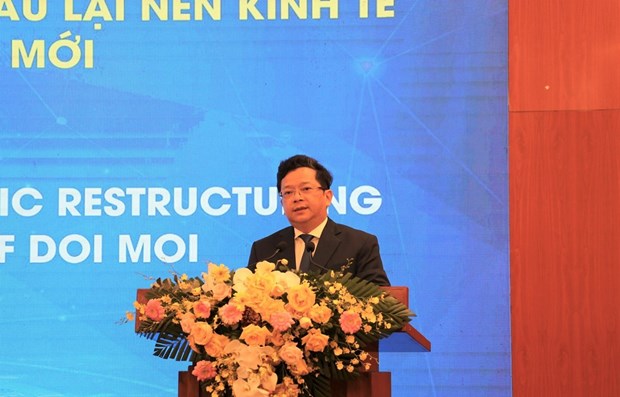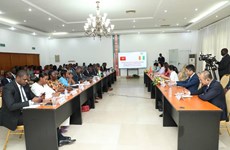Restructuring economy highlights role of the market: Experts
 Deputy Head of the Central Economic Commission, Nguyen Duc Hien speaks at the conference. (Photo: Vietnamplus)
Deputy Head of the Central Economic Commission, Nguyen Duc Hien speaks at the conference. (Photo: Vietnamplus)To renew growth and restructuring of Vietnam’s economy to achieve set goals, economic experts believe that is it important to develop a market-based economy, especially the resource and land markets.
News on the importance of markets was delivered at a workshop on Transformation of growth models, restructuring of the economy: 35 years of experience in innovation" organized by the Central Economic Commission in collaboration with the German Agency for International Cooperation (GIZ) on April 26.
Slow in transition
Deputy Head of the Central Economic Commission Nguyen Duc Hien emphasized that through the implementation of a number of guidelines and policies related to the renewal of the growth model and restructuring of the economy, Vietnam’s economy has achieved significant results, particularly in basic macroeconomics and economic growth.
The transitional growth of the economy based on markets need to be diversified so manufacturing develops in Vietnam, and raw materials are not sent abroad.
However, Hien also pointed out that the diversification-based growth model has been slower than required. At present, Vietnam's growth model is still mainly based on inputs, including capital, labor, and natural resources.
Therefore, the contribution of total factor productivity (TFP) to economic growth is still limited and much lower than that of other countries in the region (at the same development stage). Labor productivity is still low and the gap between Vietnam and other countries continues to widen.
Hien said that an increase in labor productivity over the past time is mainly due to increase in investment capital, low-cost labor and economic activities that use unskilled laborers. In addition, the economy still relies on exports and increasing foreign investment., which limits growth.
'Smart integration' with the world economy
At the event, the delegates exchanged results of renewal of growth model, restructuring of economy and reviewed the experience of Vietnam over the past 35 years of innovation.
Associate professor, Dr. Tran Dinh Thien, former director of the Vietnam Institute of Economics, said that there should be fundamental changes in country’s economy. He believes in the simultaneous development of a variety of markets, highlighting the input resource market and the land market.
According to Thien, a constructive state must develop its business market sectors and governance institutions in line with integration commitments, keeping in mind that "internal resources are decisive".
Workshop on "Transformation of growth models, restructuring of the economy: 35 years of experience in innovation" opens on April 26. (Photo: Vietnamplus)
In the long term, Dr. Jonathan Pincus, Senior Economic Advisor, United Nations Development Program (UNDP) said that in order to narrow the gap between Vietnam and developed countries, besides maintaining the high ratio of exports to GDP, Vietnam needs to manufacture more of its own high-quality input products that serve export.
“Most of Vietnam's private enterprises are very small, meanwhile, Vietnam's large private enterprises are not in the processing-manufacturing sector, but mainly in real estate business through land speculation. Therefore, the Government needs to create a mechanism for domestic and foreign-invested enterprises to thrive.
Vietnam also needs to transform from strategy and planning to actual implementation through reducing power fragmentation,” he added.
To conclude, Nguyen Duc Hien, Deputy Head of the Central Economic Commission reaffirmed that the commission would heed recommendations for the Party and State in setting policy to restructure the economy to meet the requirements of sustainable development./.













